External links
- Biography at the Dictionary of Canadian Biography Online
- Birds of Prince Edward Island : their habits and characteristics (1891) at Internet Archive
- The natural history of Prince Edward Island at Internet Archive
Francis Bain (February 25, 1842 – November 20, 1894) was an author, scientist and farmer from North River, Prince Edward Island.
In 1865, in his time away from managing his family farm, he began a career as an amateur naturalist, collecting and cataloging the flora, fauna, and seashells of the island. He was especially interested in geology, and became an expert on the bedrock and fossils of PEI. In an 1882 study, he proposed that it would be possible to dig a tunnel under the Northumberland Strait, which would have enabled the federal government to honour its commitment made when PEI entered Confederation, that constant communication with the mainland be provided. He would later be hired by the federal government to do a more in-depth investigation of the idea, although it was never carried out.
Following Sir William Dawson's geological report of 1871, Bain continued the quest to explore the Island's rocks for fossils. Bain added to the record of fossil plants in particular. One of his discoveries was named by Sir William in his honour: Tylodendron baini. Bain wrote enthusiastically on natural history in a column in the Daily Examiner, as well as publishing many papers in scholarly journals. He authored two books The natural history of Prince Edward Island (1890) and Birds of Prince Edward Island (1891).
A monument in his honour is located in Queens Square in Charlottetown, incorporating a glacial erratic hauled to the site.
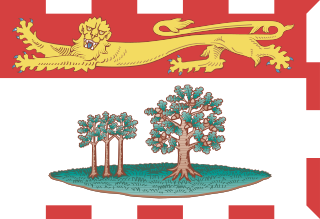
Prince Edward Island is an island province of Canada. While it is the smallest province in terms of land area and population, it is the most densely populated. The island has several nicknames: "Garden of the Gulf", "Birthplace of Confederation" and "Cradle of Confederation". Its capital and largest city is Charlottetown. It is one of the three Maritime provinces and one of the four Atlantic provinces.

The University of Prince Edward Island (UPEI) is a public university in Charlottetown, Prince Edward Island, Canada, and the only university in the province. Founded in 1969, the enabling legislation is the University Act, R.S.P.E.I 2000.
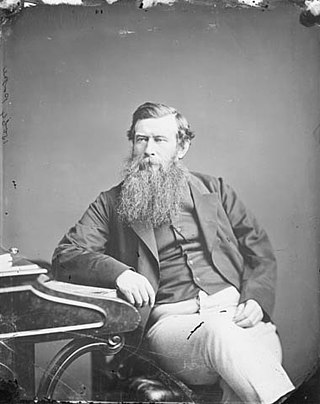
William Henry Pope was a Canadian lawyer, politician, journalist, judge and one of the Fathers of Confederation.
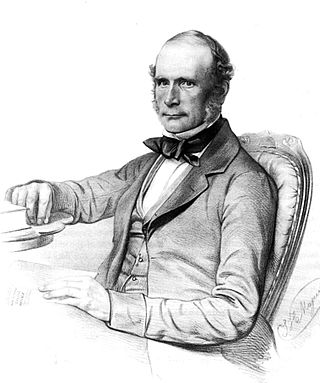
Hugh Edwin Strickland was an English geologist, ornithologist, naturalist and systematist. Through the British Association, he proposed a series of rules for the nomenclature of organisms in zoology, known as the Strickland Code, that was a precursor of later codes for nomenclature.
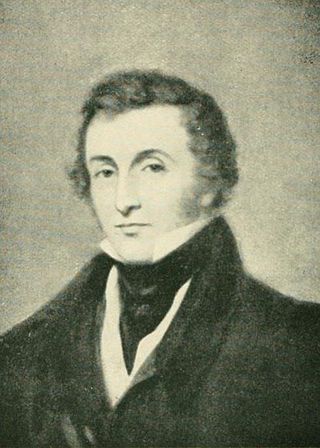
Sir William Jardine, 7th Baronet of Applegarth FRS FRSE FLS FSA was a Scottish naturalist. He is known for his editing of a long series of natural history books, The Naturalist's Library.

Robert Jameson FRS FRSE was a Scottish naturalist and mineralogist.
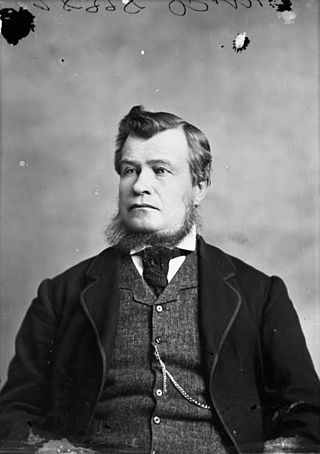
James Colledge Pope, was a land proprietor and politician on Prince Edward Island (PEI), Canada. He served as premier of the colony from 1865 to 1867, and from 1870 to 1873. He was premier of PEI in 1873 when the island joined Canadian confederation.

Neil McLeod was a Prince Edward Island lawyer, judge, politician, the fifth premier, and Leader of the Opposition during the amalgamation of the Prince Edward Island legislature. He was born at Uigg on the island to Roderick McLeod and Flora McDonald, Baptist immigrants from the Isle of Skye in Scotland. He was educated at the Uigg Grammar School and in Wolfville, Nova Scotia, articled in law at Charlottetown and was called to the bar in 1873. Four years later, his marriage to the beloved Isabella Jane Adelia Hayden, the Methodist granddaughter to Irish Roman Catholic immigrant and merchant John Roach Bourke, furthered Gaelic intersections among Islander cultural enclaves. McLeod was the child of immigrants from the Isle of Skye. Between 1886-1893, transcriptions by parliamentary reporters and petition amanuenses identified him as both "Neil McLeod" and "Neil MacLeod." Reporters included his 5th Queens district next to his name in order to distinguish him from Angus MacLeod. Charlottetown dailies that reproduced passages from the transcriptions also replicated the spelling variation during this period. Historians continue to research his positions on the 1882 replacement of French-language texts with bilingual readers for French Acadians, late nineteenth-century prohibitions on Canadian Gaelic, and corporal punishment in Prince Edward Island schools. During this period, McLeod practiced law with partner Edward Jarvis Hodgson before joining the McLeod, Morson, and McQuarrie law firm. He also served as Commissioner for the Poor House and as a "trustee" to the public Prince Edward Island Hospital for the Insane, which replaced the Lunatic Asylum following a Grand Jury inquest. In 2019, mental health officer and occupational therapist Tina Pranger examined the presents and pasts of the Hillsborough Hospital, providing a summation of previous assessments of the inquest by historians and curators.

Sir William Wilfred Sullivan was a Prince Edward Island journalist, politician and jurist, the fourth premier of Prince Edward Island.

Donald Farquharson was a Canadian politician who served as the eighth premier of Prince Edward Island.

Sir Frederick McCoy, was an Irish palaeontologist, zoologist, and museum administrator, active in Australia. He is noted for founding the Botanic Garden of the University of Melbourne in 1856.

Richard Lydekker was an English naturalist, geologist and writer of numerous books on natural history.
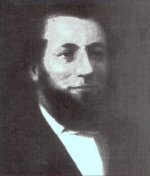
John Yeo was a Canadian farmer, ship builder and parliamentarian.
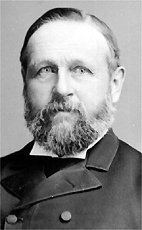
Donald Ferguson, was a Canadian politician.
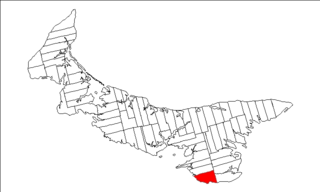
Lot 62 is a township in Queens County, Prince Edward Island, part of St. John's Parish. Lot 62 was awarded to Richard Spry, Esquire in the 1767 Land Lottery, and came to be settled through the efforts of Thomas Douglas, The 5th Earl of Selkirk in 1803. Richard Spry, Esquire, was then Commodore, Commander-in-Chief, Mediterranean Fleet at Gibraltar 1766–1769. Becoming the proprietor, he would be familiar with then the Island of St. John, having first come out to North America in 1754, with the English naval blockade of Ile Royal and the Fortress of Louisbourg in 1756, and then serving off Quebec and in the St. Lawrence into 1759. In 1762, he returned as Commander-in-Chief, North America, quartered in Halifax.
The politics of Prince Edward Island are centred on a provincial government resembling that of the other Canadian provinces. The capital of the province of Prince Edward Island is Charlottetown, where the lieutenant governor and the premier reside, and where the provincial legislature and cabinet are located.
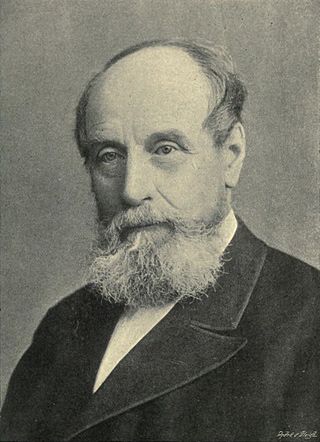
Sir John William Dawson (1820–1899) was a Canadian geologist and university administrator.
Colonel Sir Aretas William Young was a British Army officer and colonial administrator of the early nineteenth century. After extensive military service in the Peninsular War and elsewhere, Young held a range of colonial government roles in the West Indies and Prince Edward Island, of which he was Lieutenant Governor. Young was knighted in 1834 for his colonial service. While in office at Charlottetown, he died, and was replaced by General John Harvey. Sir Aretas is a direct ancestor of the musician Will Young.
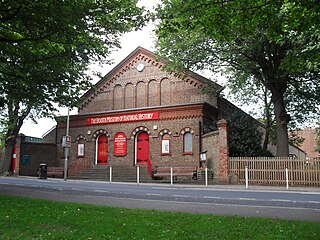
Booth Museum of Natural History is a charitable trust managed, municipally-owned museum of natural history in the city of Brighton and Hove in the South East of England. Its focus is on Victorian taxidermy, especially of British birds, as well as collections focusing on entomology, chalk fossils, skeletons and botany. It is part of "Royal Pavilion & Museums Trust". Admission to the museum is free.

The Court of Appeal of Prince Edward Island is the appellate court for the Canadian province of Prince Edward Island, and thus the senior provincial court below the Supreme Court of Canada. As the number of appeals heard by the Supreme Court of Canada is extremely limited, the Court of Appeal is in practice the court of final appeal for most residents of Prince Edward Island.